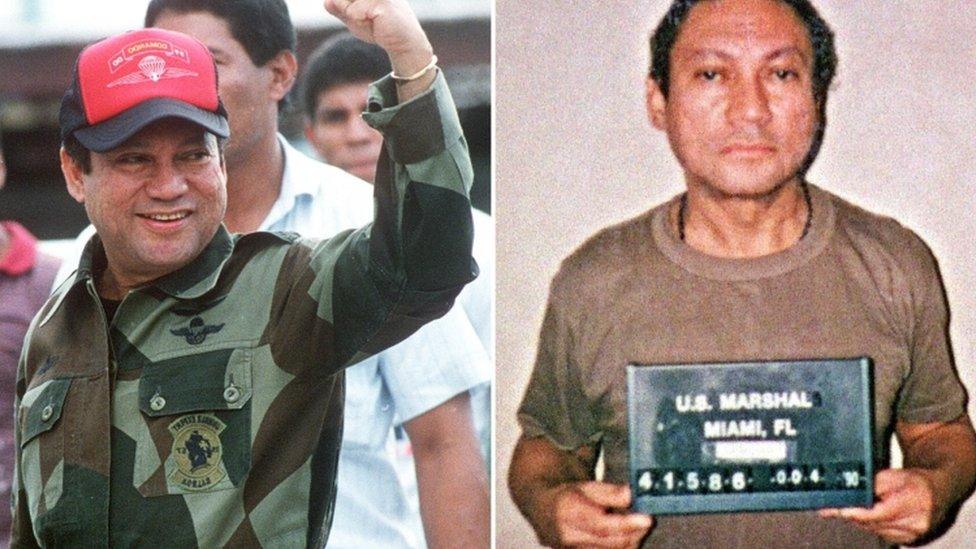Music torture: How heavy metal broke Manuel Noriega
- Published

Over Christmas 1989, US soldiers used music to lay siege to Panama's General Manuel Noriega
Everyone has at least one song that sets their teeth on edge. Most of the time, they're easy to avoid.
But what if you'd lost the power to change the TV channel, switch off the radio, or simply walk away?
What if someone played it non-stop for an hour. A day. A week. Even longer?
This is "music torture" - and while some of its practitioners say it shouldn't count as torture, there's little doubt it works.
On Christmas Day, 1989, Panamanian strongman General Manuel Noriega - who died this week - became the most famous victim.
The repressive military leader had holed himself up in the Vatican's embassy in Panama City, after President George Bush Senior invaded Panama.
Noriega was facing a US indictment for drug-trafficking, as well as claims he had rigged the 1989 election.
The embassy was surrounded by US troops, but he refused to give himself up.
The US army decided to use psychological warfare - by blasting a wall of sound non-stop outside. A fleet of Humvees mounted with loudspeakers rolled in, and rock music rolled out.
The troops' playlist came care of the Southern Command Network, the US military radio in central America. It featured hits picked for their irony value, including I Fought The Law by The Clash, Panama by the stadium rock band Van Halen, U2's All I Want Is You, and Bruce Cockburn's If I Had A Rocket Launcher.
Guns'N'Roses and The Doors both played starring roles.

Guns'N'Roses tracks like Welcome to the Jungle featured on the "Noriega playlist"

Noriega was in power in October 1989 but by January 1990 was in Miami facing drugs charges
The full list has been saved for posterity in The George Washington University's National Security Archive, while parts of it are available on YouTube, external.
Perhaps inevitably, The Holy See complained to President Bush, and the musical war was stopped after three days.
By 3 January 1990 the general, said to be an opera lover, had agreed to surrender.
It's hard to say if it was The Clash wot won it, but the US Army has often repeated the approach.
In February 1993, law enforcement agents and the military laid siege to a Texas compound belonging to the Branch Davidians cult, trying to arrest its leader David Koresh.
During the 51-day stand-off, it is claimed they played pop music - including Nancy Sinatra's These Boots Are Made for Walkin' - and the sound of jet planes all night. The onslaught included Tibetan chanting and the screams of rabbits being slaughtered.
The US also deployed Metallica and Thin Lizzy on the frontline in Afghanistan in 2010., external
Marines reportedly blared heavy metal into villages in Marjah for several hours, along with threats to the Taliban.
One officer put it succinctly: There are no obscenities, "but we tell them they're gonna die".

Metallica singer James Hetfield has said he is proud that his music is used against enemies of the US
Metallica's Enter Sandman had became a particular favourite at the height of the War on Terror, when US interrogators admitted using music to break the resistance of captives in Iraq. The goal was to deprive them of sleep and offend their cultural sensibilities.
Unco-operative prisoners were exposed to children's TV music from Sesame Street, external, and the purple singing dinosaur Barney.
Sergeant Mark Hadsell of the Psychological Operations Company (Psy Ops) told Newsweek magazine: "These people haven't heard heavy metal. They can't take it.
"If you play it for 24 hours, your brain and body functions start to slide, your train of thought slows down and your will is broken. That's when we come in and talk to them."
"In training, they forced me to listen to the Barney I Love You song, external for 45 minutes. I never want to go through that again," one US operative told Newsweek.

Music as a weapon: Tracks the US has allegedly used
Enter Sandman - Metallica
The Real Slim Shady - Eminem
I Love You - from the children's TV show Barney & Friends
The theme music from Sesame Street
Staying Alive - The Bee Gees
Babylon - David Gray
Dirrty - Christina Aguilera feat. Redman

In 2003, Rick Hoffman, vice president of the Psy Ops Veterans' Association, told BBC Radio 4's Today programme that such a tactic would have no long-lasting effect on prisoners.
"The use of this kind of audio-technique is rather new in interrogation," he said.
"There have been other kinds of non-lethal, non-harmful techniques, such as sleep deprivation... which leave no long-lasting effects but do have the end result of breaking down the individual's will to resist questioning."
Former prisoners disagree.
UK resident and ex Guantanamo Bay detainee Binyam Mohamed told the Human Rights group Reprieve: "There was loud music, [rapper Eminem's] Slim Shady and Dr Dre for 20 days. [...] Plenty lost their minds. I could hear people knocking their heads against the walls and the doors, screaming their heads off."

Former Guantanamo Bay prisoner Binyam Mohamed said people "lost their minds" thanks to music torture
Haj Ali, who was also held at Guantanamo, told the Daily Mirror that his captors deliberately played only the title phrase of a David Gray song.
"Babylon... Babylon... Babylon... over and over again. It was so loud I thought my head would burst. It went on for a day and a night," he said.
The United Nations and the European Court of Human Rights have banned the use of loud music in interrogations. The human rights group Amnesty International counts it as a method of torture.
"It's important to appreciate that this is not about 'music' in any normal sense," Amnesty's Sara MacNeice told the BBC, external, "but more like an aural assault on a person designed to intimidate, disorientate and eventually break down a prisoner.
"Whether it's the use of loud music, extremes of heat or light, painful 'stress' positions or simulations of drowning, these techniques are cruel and inhuman and strictly forbidden under international law."
- Published30 May 2017

- Published8 March 2017

- Published11 December 2011

- Published29 June 2010